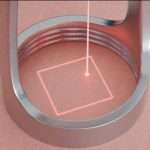The integration of artificial intelligence (AI) into laser aesthetic technology marks a major leap forward in the beauty and medical industry. From personalized settings to real-time safety enhancements, AI-powered laser machines offer unparalleled precision, efficiency, and patient satisfaction. However, as with any data-driven innovation, this advancement comes with critical privacy and data security concerns that must not be overlooked.
The Advantages of AI in Laser Aesthetic Devices
1. Personalized Treatment
AI algorithms can analyze a patient’s skin type, hair density, and treatment history to automatically adjust parameters like pulse duration, energy level, and spot size. This ensures optimized results across all Fitzpatrick skin types.
2. Enhanced Safety
AI systems detect skin reactions in real time, minimizing the risk of burns or adverse effects by issuing automatic warnings or adjusting settings to prevent harm.
3. Improved Treatment Outcomes
AI learns from past sessions, tailoring subsequent treatments for better outcomes and faster results, especially in laser hair removal technology with artificial intelligence.
4. Efficient Workflow for Clinics
Automated settings and smart diagnostics reduce human error and increase the speed of each session, resulting in better throughput and improved patient turnover.
5. Intelligent Lesion and Skin Pattern Analysis
Advanced models can identify skin anomalies or pigmentation patterns, suggesting appropriate treatments beyond hair removal, including vascular or pigmented lesions.
The Dark Side: Privacy & Data Security Concerns
While the benefits of AI are transformative, the collection, storage, and use of sensitive patient data introduces serious ethical and legal challenges—especially when it comes to compliance with global privacy laws like GDPR (Europe) and HIPAA (USA).
1. Sensitive Data Collection
AI-enabled laser machines often gather:
- Skin tone, hair type, and treatment zones
- Photos (before/after treatments)
- Session histories and patient responses
- Potentially identifiable data (e.g., age, gender, skin conditions)
Improper handling or unauthorized use of this data can result in serious breaches of trust and legal consequences.
2. Compliance with Global Privacy Regulations
✅ GDPR (General Data Protection Regulation – EU)
If the clinic is based in the EU or serves EU patients, it must comply with strict GDPR requirements:
- Explicit patient consent for data collection
- Right to access, edit, or delete personal data
- Use of secure data storage and encrypted connections
- Clear privacy policy disclosures on how data is used
✅ HIPAA (Health Insurance Portability and Accountability Act – USA)
For US-based clinics or any device handling medical data:
- Patient records must be encrypted
- Access to data must be restricted and logged
- Data breaches must be reported
- Only HIPAA-compliant cloud storage solutions should be used
3. Cybersecurity Risks
❗ Data Leaks:
Cloud-connected laser systems are vulnerable to hacking if security protocols aren’t robust.
❗ Unauthorized Data Use:
Manufacturers might use patient data to train algorithms or improve devices without clear consent, raising ethical and legal red flags.
❗ AI Bias:
If AI models are trained on biased or incomplete datasets, they may produce less effective or even harmful outcomes for certain skin types or conditions.
4. Recommendations for Clinics and Manufacturers
✅ Use strong data encryption at every step
✅ Store data on secure, compliant servers (preferably localized)
✅ Implement anonymization or pseudonymization
✅ Obtain clear, written patient consent before data usage
✅ Publish transparent privacy policies on websites and forms
✅ Regularly audit your system for security vulnerabilities
✅ Ensure staff is trained on data protection and ethical AI use
Conclusion: AI-powered laser machines
AI-powered laser machines represent the future of aesthetic medicine, delivering smarter, faster, and more accurate treatments. But this future can only be sustainable if it is built on a foundation of trust, transparency, and strong privacy protections.
Clinics, device manufacturers, and practitioners must work together to not only advance technology, but also uphold ethical responsibility. Only then can we fully unlock the potential of laser hair removal technology with artificial intelligence—without compromising patient safety or privacy.
Contact us today for a free consultation!







